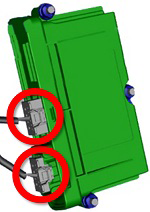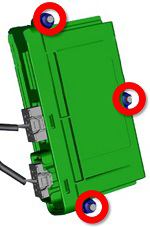Tesla Model S: Module - Sunroof Controller (RHD) (Remove and Replace)
Tesla Model S (2012-2026) Service Manual / Electrical / Module - Sunroof Controller (RHD) (Remove and Replace)
Warning: If the 12V power supply is disconnected, do not attempt to open any doors with door glass in closed position. Failure to follow this instruction could result in door glass shatter.
Note: Before disconnecting the 12V power supply, ensure that the driver's door window is fully open. Failure to follow this instruction could result in vehicle lockout.
Removal
- Move the passenger seat to its rearmost position.
- Disconnect 12V power.
- Rear wheel drive (RWD): Refer to procedure.
- Dual Motor: Refer to procedure.
- Remove the LH footwell cover (refer to procedure).
- Carefully peel back the front LH carpet for access. Caution: Take care not to damage component(s).
- Remove the bolts (x3) that secure the module cover panel.
- Disconnect the controller harness connectors (x2).

- Remove the nuts (x3) that secure the controller to the studs on
the bulkhead (torque 5 Nm).

- Remove the controller from the vehicle.
Installation procedure is the reverse of removal, except for the following:
-
Use Toolbox to update or redeploy the firmware:
- If the vehicle is not running the latest firmware, run the "Vehicle Firmware Update" procedure.
- If the vehicle is running the latest firmware, run the "Firmware Redeploy" procedure.
READ NEXT:
 Module - Air Suspension - ECU (Remove and Replace)
Module - Air Suspension - ECU (Remove and Replace)
Warning: If the 12V power supply is disconnected, do
not attempt to open any doors with door glass in closed position.
Failure to follow this instruction could result in door glass
shat
 Module - Air Suspension - ECU (Remove and Install)
Module - Air Suspension - ECU (Remove and Install)
Warning: If the 12V power supply is disconnected, do
not attempt to open any doors with door glass in closed position.
Failure to follow this instruction could result in door glass
shat
 Module - Air Suspension - ECU (RHD) (Remove and Replace)
Module - Air Suspension - ECU (RHD) (Remove and Replace)
Warning: If the 12V power supply is disconnected, do
not attempt to open any doors with door glass in closed position.
Failure to follow this instruction could result in door glass
shat
SEE MORE:
 Panoramic Roof
Panoramic Roof
Annual Service
Note: Not all of the procedures listed here need to be
performed at each Annual Service. Refer to SC-15-00-001 for a list of
the procedures to perform at the relevant service interval.
Check for Alerts, Repair any Issues Found, Clear Alerts
Connect a laptop with
 Side Applique - 1st Generation - LH (Remove and Replace)
Side Applique - 1st Generation - LH (Remove and Replace)
Warning: To avoid
personal injury, wear cut-resistant gloves when performing this
operation.
Special tools required for this procedure:
Supplier
Part Number
Description
© 2019-2026 Copyright www.tesms.org

